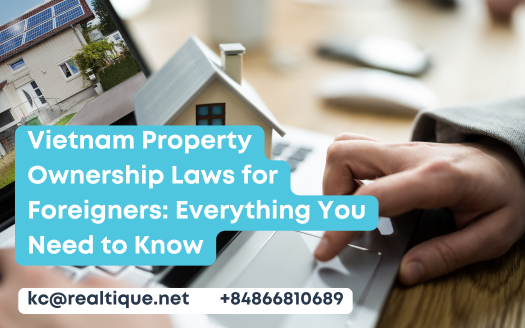Vietnam Property Ownership Laws for Foreigners: Everything You Need to Know
Vietnam has become an increasingly attractive destination for foreign real estate investors, thanks to its strong economic growth, affordable property prices, and high rental yields. However, unlike some other countries in the region, Vietnam does not offer freehold property ownership to foreigners. Instead, foreign investors must navigate leasehold agreements, ownership limits, and legal restrictions.
This comprehensive guide covers everything you need to know about Vietnam’s property ownership laws for foreigners, including legal provisions, property rights, investment options, and important regulations for 2025.
Table of Contents
Vietnam’s Housing Law for Foreign Buyers
Foreign property ownership in Vietnam is governed by the Housing Law of 2014, which opened the market to foreign investors for the first time. Under this law:
- Foreigners can buy and own apartments and houses in Vietnam.
- Land ownership is not allowed, as all land in Vietnam is state-owned.
- Foreigners can hold property on a 50-year leasehold, with possible renewal.
- Foreigners can own up to 30 percent of the apartments in a single building.
- Foreigners can own up to 10 percent of houses in a landed residential project.
Vietnam’s Land Law and Foreign Ownership Restrictions
Unlike locals, foreigners cannot own land outright in Vietnam. Instead, property ownership is structured through land-use rights (LURs), which allow long-term use under leasehold arrangements.
Can Foreigners Own Property in Their Own Name?
Yes, foreigners can purchase apartments and houses under their personal name, provided they meet the ownership conditions. However, land ownership remains restricted to Vietnamese citizens and entities.
Leasehold Ownership for Foreigners
Foreign buyers in Vietnam purchase property under a 50-year leasehold agreement, which can often be extended for another 50 years, subject to government approval.
Can Leasehold Apartments Be Sold or Rented Out?
Yes, foreigners can:
- Sell their leasehold apartment to another foreigner or a Vietnamese citizen.
- Rent out the apartment for rental income, subject to tax regulations.
- Transfer the property to their heirs or family members.
Freehold Property for Foreigners Married to Vietnamese Citizens
If a foreign investor is married to a Vietnamese citizen, they may qualify for freehold ownership, similar to Vietnamese nationals.
Property Investment Opportunities for Foreigners in Vietnam
Best Property Types for Foreign Buyers
Foreigners looking to invest in Vietnam’s real estate market have several options, including:
- Apartments and Condos: The most common choice for foreign investors, especially in Ho Chi Minh City and Hanoi.
- Luxury and Serviced Apartments: High-end properties offering premium rental income.
- Resort Villas and Beachfront Properties: Popular in Da Nang, Nha Trang, and Phu Quoc, often rented as vacation homes.
Best Cities for Foreign Investment
- Ho Chi Minh City: Strong rental market, high demand, and rapid urban development.
- Hanoi: The political capital, with growing high-end developments.
- Da Nang and Nha Trang: Attractive beachfront destinations for resort investments.
Can Foreigners Invest in Land Development?
While individual foreigners cannot own land, foreign companies can lease land for development purposes, making commercial and industrial real estate investment possible.
Legal Requirements and Taxation for Foreign Property Buyers
Legal Process for Foreigners Buying Property in Vietnam
- Choose a Property: Verify that it is legally available for foreign ownership.
- Sign a Sales and Purchase Agreement (SPA): Includes payment terms, delivery timeline, and ownership details.
- Pay for the Property: Payments must be made in Vietnamese Dong (VND) through an authorized local bank.
- Obtain Ownership Certificate (Pink Book): The official document proving property ownership.
Taxes and Fees for Foreign Property Owners
Foreign investors should be aware of the following taxes:
- Value Added Tax (VAT): 10 percent of the purchase price.
- Maintenance Fee: 2 percent of the property value (one-time payment).
- Rental Income Tax: 5 percent VAT plus 5 percent personal income tax.
- Capital Gains Tax: 2 percent of the final sale price when selling the property.
Are There Any Restrictions on Renting Out Properties?
Foreign investors can legally rent out their properties, but they must register rental income with tax authorities and comply with local leasing regulations.
Future Trends and Expected Changes in Vietnam’s Property Ownership Laws
Will Foreign Ownership Laws Change in 2025?
The Vietnamese government has been considering further easing foreign ownership restrictions to attract more international investment. Potential changes could include:
- Extending leasehold periods beyond 50 years for foreign buyers.
- Allowing a higher percentage of foreign ownership in certain real estate projects.
- Introducing clearer pathways for foreign property investors to gain permanent residency.
Should Foreigners Invest in Vietnam’s Property Market Now?
Vietnam remains one of the most attractive property investment destinations in Southeast Asia, offering:
- Affordable real estate prices compared to regional markets like Bangkok and Singapore.
- Strong rental demand from a growing middle class and expatriate population.
- Long-term capital appreciation, especially in major cities.
Foreign investors looking to enter the market should stay updated on policy changes and seek legal guidance to ensure compliance with property ownership regulations.
Vietnam’s property market offers great opportunities for foreign investors, but understanding the legal framework and ownership regulations is essential for making informed decisions. While foreigners cannot own land outright, they can still invest in apartments, condos, and commercial real estate under leasehold agreements.
For expert guidance on buying property in Vietnam, contact Realtique today. Our team specializes in helping foreign investors navigate legal requirements, find the best properties, and secure profitable real estate investments in Ho Chi Minh City, Hanoi, and other prime locations.
Visit Realtique.net to get started with your investment journey in Vietnam.
























